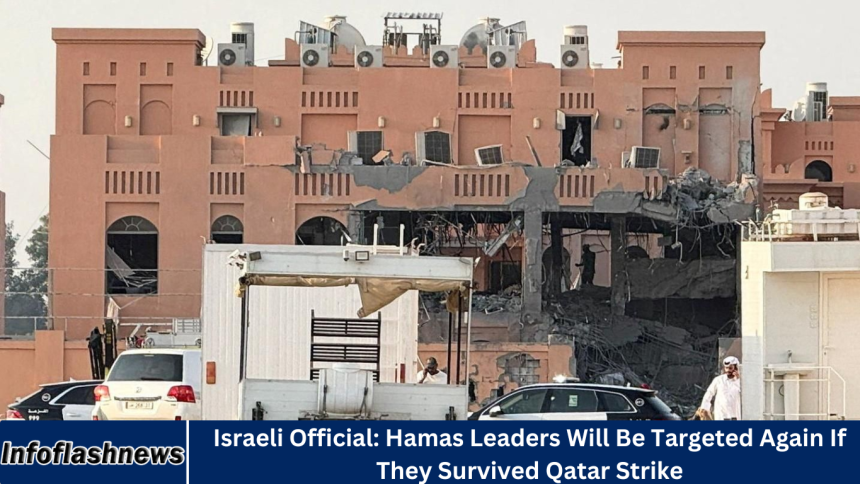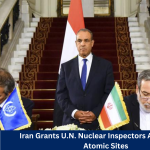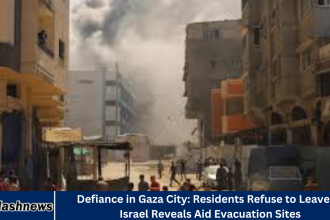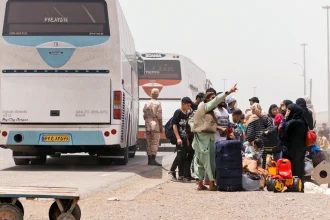In a striking declaration that has sent ripples through the global diplomatic community, a senior Israeli official has confirmed that Israel will retarget Hamas leaders if they survived a recent alleged Israeli airstrike in Qatar. The comments, made during a televised interview on an Israeli news network, have intensified ongoing discussions around the legitimacy of targeted assassinations, the extraterritorial reach of Israeli military operations, and the fragile geopolitics of the Middle East.
The statement underscores Israel’s continued policy of pursuing high-ranking Hamas operatives anywhere in the world, particularly those it holds responsible for planning or financing attacks on Israeli citizens.
This development marks a potentially escalatory shift in Israel’s counterterrorism strategy, especially if confirmed to have taken place within Qatari territory, a move that could have far-reaching diplomatic repercussions.
More Read: Defiance in Gaza City: Residents Refuse to Leave as Israel Reveals Aid Evacuation Sites
Background: Israel’s Longstanding Policy of Targeting Hamas Leaders
The Israeli government has long pursued a policy of targeted killings of Hamas leaders, which it sees as a necessary countermeasure against terrorism. These operations have historically been concentrated in the Gaza Strip, West Bank, and occasionally in Lebanon and Syria, where various Hamas officials and operatives are known to operate.
However, a potential operation in Qatar represents a significant geographic and political expansion of this strategy. Qatar has long been viewed as a safe haven for Hamas political leaders, including Ismail Haniyeh, Khaled Meshaal, and others who have lived and operated freely in Doha under the protection of the Qatari government.
Israel accuses these leaders of continuing to plan and fund military operations against Israeli civilians, even while living in exile. A senior Israeli intelligence source recently told local media, “No one involved in terrorism against Israelis is beyond our reach, regardless of geography.”
The Alleged Strike in Qatar: What We Know So Far
Reports began circulating in early September 2025 that a drone or missile strike had occurred in the diplomatic district of Doha, Qatar’s capital. While Qatari authorities initially denied any attack, videos posted on social media showed explosions near a private villa complex rumored to house high-ranking Hamas political figures.
Shortly after the incident, Israeli media outlets reported—citing unnamed defense sources—that the attack had been an Israeli intelligence operation targeting senior Hamas leadership.
Qatar has neither confirmed nor denied the identities of those affected by the strike. However, a Hamas spokesperson claimed that no senior leaders were harmed, dismissing the strike as “Zionist propaganda and a failed assassination attempt.”
Israeli Official Confirms Intent to Strike Again
In an interview on Israeli Channel 12 News, Deputy Defense Minister Eli Ben-David stated:
“If any of the Hamas leadership survived the recent operation in Qatar, they should know they are still on our list. Israel will not stop until those responsible for massacres and terrorism are brought to justice.”
This remark is the first official acknowledgment from the Israeli government that it was involved in the Qatar incident, even though it stops short of explicitly confirming Israeli responsibility for the strike.
Ben-David’s comments are seen as both a warning to Hamas and a message to allies and adversaries: Israel is willing to act beyond its borders to defend its citizens and punish those responsible for acts of terror.
Hamas Responds: “This Is a Declaration of War”
In response to the Israeli official’s comments, Hamas released a strongly worded statement, accusing Israel of violating international law and sovereign territory:
“Israel’s aggression in Qatar is not just a crime—it is a declaration of war against the Palestinian people and our allies. We reserve the right to respond at a time and place of our choosing.”
The statement also condemned the Qatari government for failing to provide adequate protection to Hamas leadership, hinting at growing tension between the group and its longtime host.
Implications for Qatar-Israel Relations
While Israel and Qatar have no formal diplomatic ties, Qatar has long played a mediating role in the Israeli-Palestinian conflict. The Gulf nation has facilitated ceasefire negotiations, provided humanitarian aid to Gaza, and helped broker prisoner swaps in the past.
An Israeli operation on Qatari soil—if confirmed—would constitute a severe breach of sovereignty, potentially derailing backchannel negotiations and sparking a diplomatic crisis.
Middle East analyst Dr. Rami Khoury commented:
“An Israeli attack in Doha is not just about Hamas. It challenges Qatar’s role as a regional mediator and could shift the entire diplomatic balance in the Gulf.”
International Reaction: Caution and Condemnation
The international community has responded with mixed reactions. The United States, Israel’s closest ally, has neither confirmed nor denied the allegations but reiterated its stance on fighting terrorism globally.
A spokesperson for the U.S. State Department said:
“While we support Israel’s right to self-defense, we urge all nations to respect international law and national sovereignty.”
Iran, a known backer of Hamas, condemned the attack and promised “support for the Palestinian resistance.” Meanwhile, European Union diplomats expressed concern over extrajudicial killings, warning that they may undermine diplomatic efforts to resolve the ongoing Israel-Palestine conflict.
Legal and Ethical Questions: Targeted Killings Abroad
The prospect of an Israeli military strike within Qatar raises serious legal and ethical questions about extrajudicial killings, state sovereignty, and international norms.
Under international law, particularly the UN Charter, cross-border attacks without consent are generally prohibited unless undertaken in self-defense or with explicit UN Security Council approval.
Critics argue that such actions risk escalating conflicts, undermining the rules-based international order, and normalizing assassinations as state policy.
Public Opinion in Israel and Gaza
Within Israel, public opinion remains largely supportive of efforts to eliminate Hamas leadership, especially in the wake of recent rocket attacks, suicide bombings, and border infiltrations that have claimed civilian lives.
A recent poll by Haaretz found that 72% of Israelis support the use of targeted killings against Hamas figures abroad, especially those believed to be orchestrating attacks.
In Gaza, however, the strike has fueled anger and resentment. Protests erupted in several neighborhoods, with demonstrators chanting slogans against Israel and burning its flag.
Hamas has also reportedly begun relocating key personnel and increasing security protocols in its international operations in light of the potential ongoing threat.
What Comes Next: The Road Ahead
The situation remains tense, and further escalation could be on the horizon. Israel has made it clear that it will continue to pursue Hamas operatives, regardless of location. Hamas, in turn, has promised retaliation, though its options may be limited by its current military and diplomatic isolation.
Analysts suggest the following scenarios could unfold in the coming weeks:
-
Further Israeli operations targeting Hamas abroad, possibly in other Middle Eastern or African nations.
-
Hamas retaliation, potentially via proxy groups like Islamic Jihad or Hezbollah.
-
Qatar revisiting its relationship with Hamas amid growing international scrutiny.
-
Increased diplomatic tensions between Israel and nations seen as hosting or supporting Hamas leadership.
Frequently Asked Question
What did the Israeli official say about targeting Hamas leaders again?
A senior Israeli official stated that if Hamas leaders survived the recent alleged Israeli strike in Qatar, they will be targeted again. This signals that Israel considers these individuals ongoing threats and will continue efforts to eliminate them.
Was there an Israeli strike in Qatar?
While Israel has not officially confirmed the strike, several Israeli media outlets and officials have strongly implied that an operation targeting Hamas leadership in Doha occurred. Qatar has not confirmed the identities of those involved, and Hamas claims its leaders were unharmed.
Why is Israel targeting Hamas leaders outside Gaza?
Israel views certain Hamas political and military leaders abroad—especially those in Qatar, Lebanon, and Turkey—as key figures responsible for orchestrating terrorist attacks. The Israeli government argues that eliminating these individuals is essential for national security.
Is it legal for Israel to carry out targeted killings in other countries?
The legality is highly contested. Under international law, such actions are generally considered violations of sovereignty unless done in self-defense. Critics argue that extrajudicial killings abroad set a dangerous precedent, while supporters cite the right to defend citizens from terrorism.
How has Hamas responded to the alleged strike in Qatar?
Hamas has condemned the strike as a “criminal act” and called it a “declaration of war.” The group has promised to retaliate, although it has not specified how or when. It also criticized Qatar for failing to ensure the safety of its leaders.
What does this mean for Israel-Qatar relations?
Israel and Qatar do not have formal diplomatic relations, but Qatar has historically played a mediating role in the Israeli-Palestinian conflict. If Israel is confirmed to have struck targets in Doha, it could severely strain unofficial ties and reduce Qatar’s willingness to act as a neutral broker.
Will there be more Israeli operations abroad against Hamas?
Based on the Israeli official’s remarks, it is likely that further operations are planned, especially if the targeted individuals survived the Qatar strike. This could mean more covert or overt actions in countries where Hamas leadership is believed to be operating.
Conclusion
The revelation that Israel is prepared to strike Hamas leaders again—even outside of traditional conflict zones—represents a dangerous and potentially destabilizing precedent in modern counterterrorism tactics. While many in Israel view this strategy as necessary for national security, others warn that it could provoke wider regional conflict and further entrench divisions. As Israel reaffirms its commitment to eliminating what it deems terrorist threats, and Hamas vows revenge, the world watches closely. What happens next could either push the region toward greater instability or force a renewed push for diplomatic solutions.














